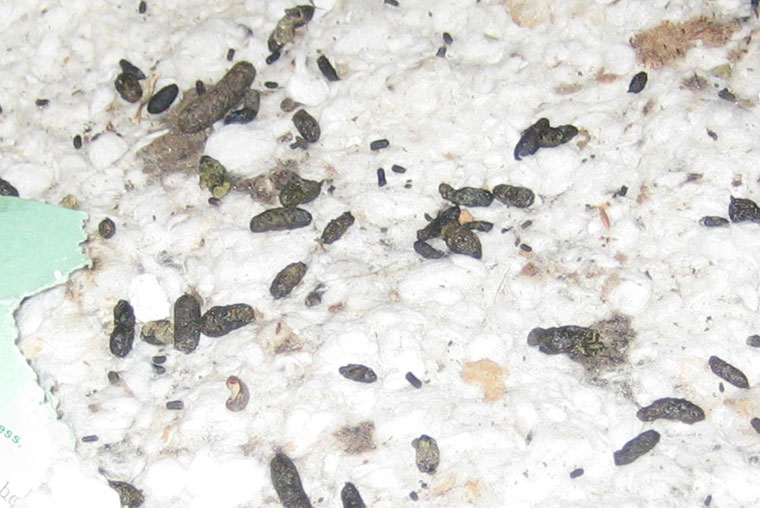- info@wildlife-removal.com
Call us for help in your town
Wildlife Removal Education
Safest and Quickest Ways to Get Rid of Rat Droppings
Need rat removal in your hometown? We service over 500 USA locations! Click here to hire us in your town and check prices - updated for year 2020.
Rat droppings are not only unsightly, they also spread disease an depending on where you are in the world some of those diseases could be potentially life-threatening.

The only way to ensure you have gotten rid of every trace of disease once rats have been safely evicted from your home, is to perform a thorough cleanup operation. If you have hired in a professional rat removal company, you may find that this is all included in the quote they give you at the beginning of the job, along with the price of any repair work they would be willing to undertake on your behalf.
If you are doing this job yourself, you need to know how to keep yourself safe, your family safe, and how to do a proper job to make sure those pests don't come back.
You MUST make sure that you have gotten rid of all biological traces of the rodents in your home, and this means using strong, biological enzyme cleaners. Urine contains pheromones and the rats use these to communicate with each other. If you do not clean away all urine, other rats will be able to detect it and try to get in. There is also a chance that the scent of that urine could attract other pests.
You will need gloves - vinyl, latex, or rubber, and make them thick. If you can't get thick gloves, wear multiple pairs of gloves. You do not want to come into contact with any biological or contaminated matter, and you certainly don't want to come across (and perhaps get bitten by) and rogue rats that are remaining.
You will want to consider wearing a face mask to avoid inhalation of any particles, and also eye protection. Do not wear clothes that you wouldn't want to get ruined/can't wash in strong cleaning products at a high temperature. (Leave the cashmere for now, ladies.)
Bleach can do the job, but you will need to make sure that you're not spraying bleach on surfaces or materials that could get stained. (You know, like the couch your wife begged you to buy for the living room.)
We recommend spraying a bleach and water solution (1/2 parts bleach and 9/10 parts water) over the affected areas and then leaving to soak. Ten minutes will do the trick. Don't leave it for too long, though. Bleach is corrosive and will damage surfaces and materials.
Make sure that you don't mix cleaning products. This can create toxic gases that lead to headaches, respiratory issues, allergies, and even fainting.
If you have a plastic dustpan and brush, use that to sweep up all the stuff that you just covered in the bleach and water solution. You will need to throw away, burn, or otherwise dispose of that dustpan and brush once you are done. You will certainly not want to use it anywhere else in your home once it has come into contact with feces from rodents.
Once all debris has been removed, give the area a good once-over with antibacterial, anti fungal, or antiseptic cleaning products, or all three, one after the other. If you can get a cleaning product that offers more than one of these at a time, use it!
Any materials that have come into contact with rats, dead rats, urine, feces, or nesting material will need to be disinfected. If you suspect that rats might have been in the bedroom, for example, you should wash all of your bed linen on as high a temperature it can go, with strong cleaners. If you can give it one wash with a strong cleaner, and then a secondary, lower-temperature wash to soften things up again, you'll have better results.
Anything that has become too damaged or soaked-in with urine or feces should be disposed of - thrown away or burned in a fire. (We recommend the latter where it is safe to do so.)
Any biological trace of those rats will spread disease or attract other animals/rats. Removing every shred of it is important to ensure you have a successful rat removal operation.
Go back to the Rat Removal page, or learn tips to do it yourself with my How to Get Rid of Rats guide.


















